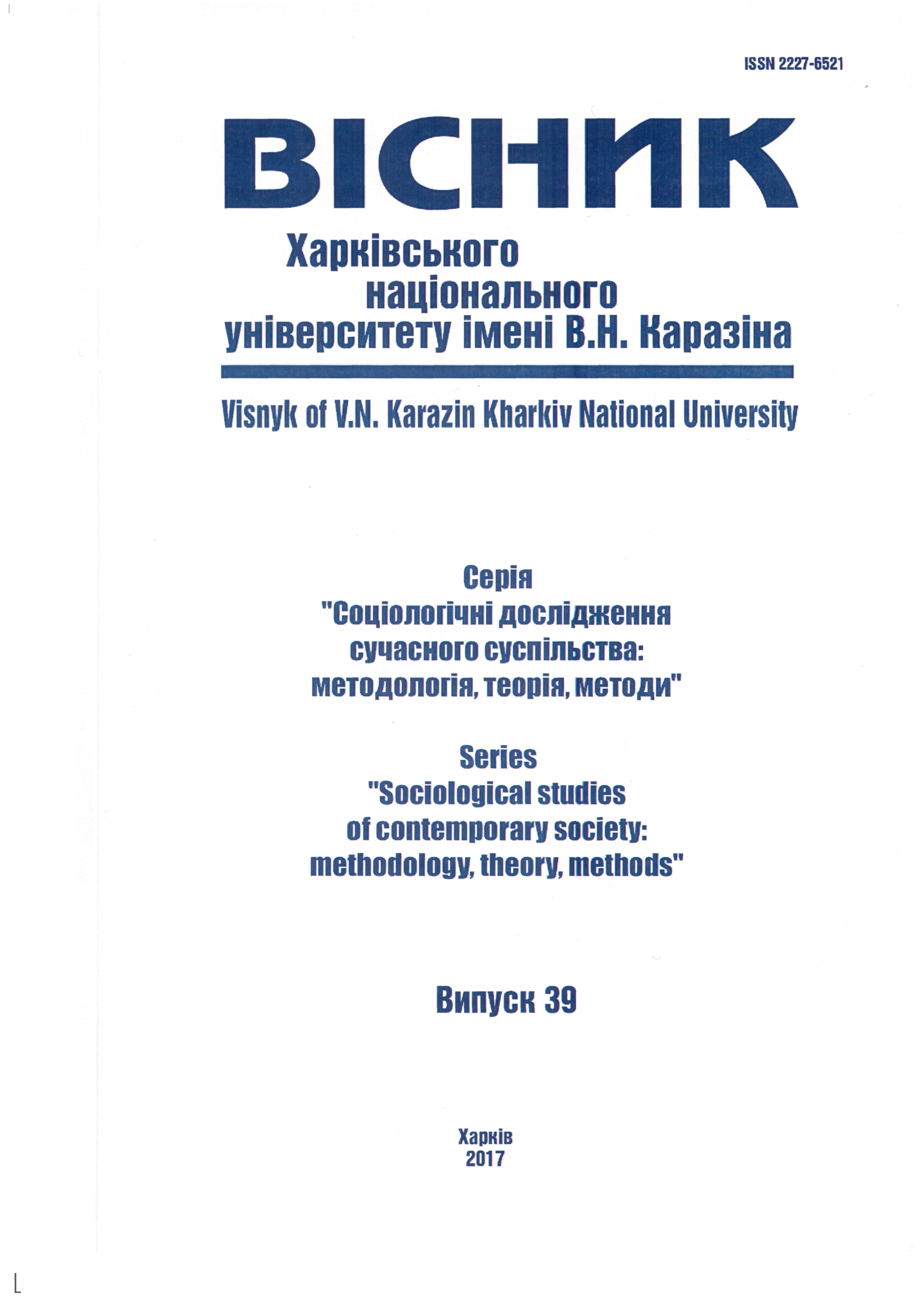Political Representation of New Social Inequalities: Perspectives and Difficulties of Sociological Development of the Problem
Abstract
The fundamental scientific problem connected with the lack of sociological knowledge about the essence and characteristics of the new social inequalities is actualized in the article. Taking into account the extremely complicated social situation in Ukraine after the turning points of the year 2014, the author points out the growth of social tension caused by the growing contradictions and social stratification, and concludes that it is necessary to find ways to reduce tensions and counteract social stratification. For this, the author proposes to carry out a large-scale analysis of new social inequalities as the most relevant and hypothetically most significant for modern processes. Noting the extremely blurred and non-specific nature of the concept of «new social inequalities», the author considers it necessary to develop the bases of analysis, beginning with the conceptual-terminological level. For this, the author undertakes a heuristic analysis of the concept of «new social inequalities» and the epistemological perspectives of investigating the political representation of new social inequalities. The author comes to the conclusion that it is possible to overcome the terminological and analytical difficulties of researching new social inequalities by concentrating the analysis on their political representation as it’s not only reflecting, but also partly conditioning the representational inequalities.
Downloads
References
Андриенко Л. К., Елисиченко О. А. Современные виды социального неравенства [Электронный ресурс] / Андриенко Л. К., Елисиченко О. А. – Режим доступа: http://www.rusnauka.com/1_KAND_2010/Psihologia/12_57325.doc.htm
Анкерсмит Ф. Р. Политическая репрезентация / Франклин Анкерсмит / Перевод с англ. Алексея Глухова. – М.: Издательский дом Высшей школы экономики, 2012. – 288 с.
Буткалюк В. Великое разделение: социальное неравенство в эпоху неолиберализма [Электронный ресурс] / Виталина Буткалюк // Спільне. – 13.09.2017. – Режим доступа: http://commons.com.ua/uk/velikoe-razdelenie-socialnoe-neravenstvo-v-epohu-neoliberalizma/
Куценко О. Д. Общество неравных. Классовый анализ неравенства в переходном обществе. Подходы западной социологии / Ольга Куценко. – Харьков: Издательский центр Харьковского национального университета имени В. Н. Каразина, 2000. – 316 с.
Липсет С., Роккан С. Структуры размежеваний, партийные системы и предпочтения избирателей. Предварительные замечания /Сеймур Липсет, Стейн Роккан // Политическая наука. Социально-политические размежевания и консолидация партийных систем. – 2004. – № 4. – с. 204-234
Малеева Т., Овчарова Л. Социальная модернизация и средний класс. Новые социальные неравенства [Электронный ресурс] / Татьяна Малеева, Лилия Овчарова // Демоскоп Weekly. Электронная версия бюллетеня «Население и общество». – 2009. – №381-382. – Режим доступа: http://www.demoscope.ru/weekly/2009/0381/tema05.php
Новоженова И. С., Зубченко Л. А. Возвращение социальных классов / И. С. Новоженова, Л. А. Зубченко [Электронный ресурс] // Перспективы. – 16.07.2007. – Режим доступа: http://www.perspektivy.info/oykumena/europe/vozvrashhenije_socialnyh_klassov_2007-07-16.htm#1 8. Новые социальные неравенства / под ред. С. Макеева – К.: Институт социологии НАН Украины, 2006. – 355 с.
Шнирельман В. Порог толерантности. Идеология и практика нового расизма. В 2-х томах. Том второй / Виктор Шнирельман/ – М.: Новое литературное обозрение, 2011. – 856 с.
Шугаева И. В. «Новые бедные» в социальной структуре современного российского общества (на материалах г. Хабаровска). Автореферат диссертации на соискание ученой степени кандидата социологических наук [Электронный ресурс] / Шугаева Ирина Владимировна. – Хабаровск, 2017. – 24 с. – Режим доступа: http://pnu.edu.ru/media/disser/referat_shugaeva.pdf
Lin J., Kelley-Moore J. New dimensions of inequality: inter-individual variability in functional limitations by race/gender [Electronical resourse] / J. Lin, J. Kelley-Moore // The Gerontologist. – 2016. – Volume 56, Issue Suppl_3, 1. – P. 22. – Access mode: https://doi.org/10.1093/geront/gnw162.091
New Dimensions of Social Inequality. Postdoctoral Research Project carried out by Dr. Charles Walker [Electronical resourse] / CEELBAS. – Title from screen. – Access mode: http://www.ceelbas.ac.uk/research/socialinequality
Vincent J. Robots and AI are going to make social inequality even worse, says new report [Electronical resourse] / James Vincent / The Verge. – 13.7.2017. – Access mode: https://www.theverge.com/2017/7/13/15963710/robots-ai-inequality-social-mobility-study
Weiss F., Roksa J. New dimensions of educational inequality: Changing patterns of combining college and work in the U.S. over time [Electronical resourse] / Felix Weiss, JosipaRoksa // Research in Social Stratification and Mobility. – June 2016. – Volume 44. – Pages 44-53. – Access mode: http://www.sciencedirect.com/science/article/pii/S0276562416300117





